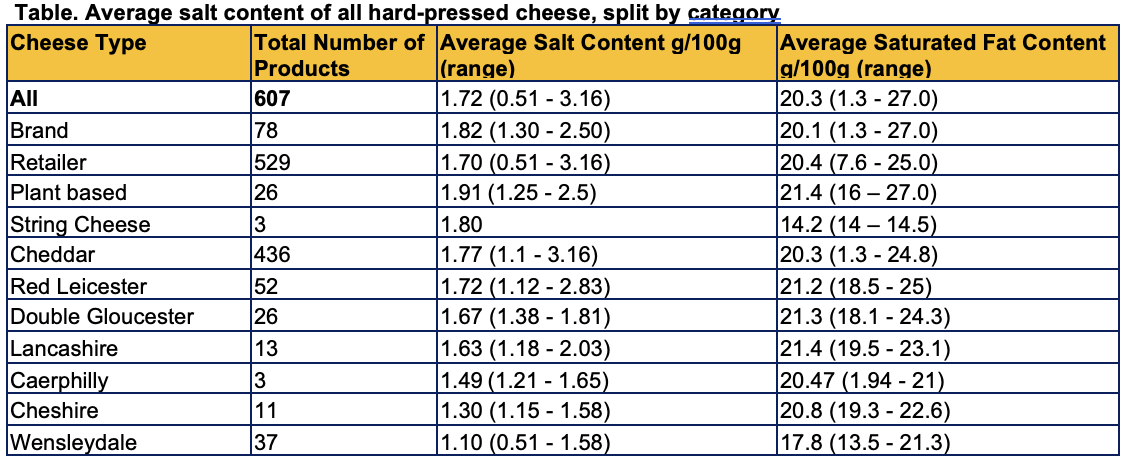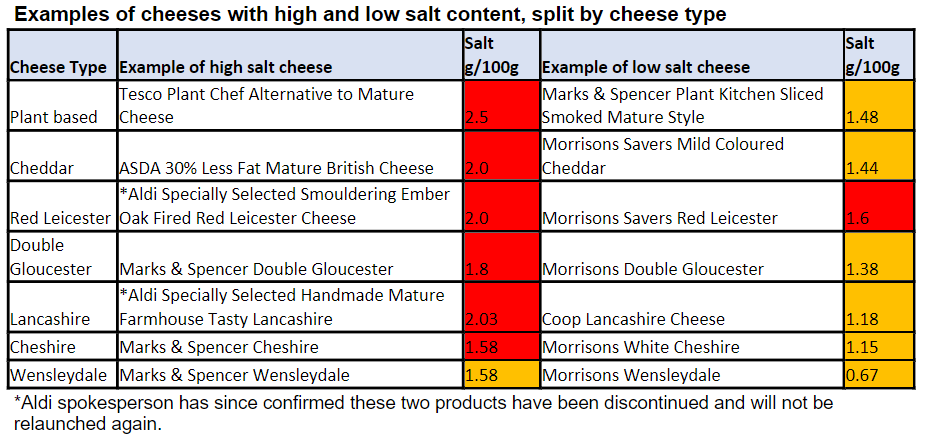Cheese Industry Showing no Signs of Salt Reduction NEW Study Shows
- The cheese industry is failing to take salt reduction seriously – with minimal reductions in cheese over the last decade – NEW data shows
- A small 30g portion of Cheddar contains more salt than a packet of crisps
- Plant-based ‘cheese’ nutritionally worse than dairy products
- Call for government to ‘get tough’ on industry and set stricter, mandatory salt reduction targets beyond 2024
Read the full report here [PDF 602KB]
UK food manufacturers are not taking salt reduction seriously enough, with minimal reductions made in cheese over the last decade. That’s according to NEW research by Action on Salt (the expert research group based at Queen Mary University of London) which assessed the salt content of over 600 Cheddar and similar cheeses across 10 retailer [1] – all of which, as a category, are considered one of the top contributors of salt to UK diets [2].
Given the amount of salt that we eat increases our blood pressure, which is the major cause of strokes and heart disease, the group of experts is now urging the government to set more stringent, mandatory salt reduction targets beyond 2024 and help prevent thousands of people from suffering or dying unnecessarily.
According to the new data, the cheeses with the highest level of salt are plant-based, averaging 1.91g/100g. That’s nearly 10% saltier than Cheddar – the nation’s favourite [1]. Plant based cheeses are equally high in saturated fat, making it not so healthy from a nutritional standpoint, despite its perceived ‘health halo’.
Cheddar follows closely behind with an average salt content of 1.78g/100g. Considering an average suggested portion of this cheese (typically a small ‘matchbox’ 30g size) equates to 0.5g salt – that’s more salt than a packet of crisps [3].
The Cheddar with the highest salt content was Asda’s 30% Less Fat Mature British Cheese, containing 2g/100g compared to Morrisons Savers Mild Coloured Cheddar which contains 28% less salt (i.e. 1.44g/100g). This proves that salt is unnecessary in such high amounts and salt reduction is achievable. With nine out of ten people reported to be buying and consuming Cheddar regularly, it’s vital that greater efforts are made to reduce the salt content across such dairy products [4].
Retailer own-branded cheese are, on average, lower in salt compared to those produced by manufacturers (1.70g vs 1.82g/100g). Morrisons comes up best with the lowest average salt level across all retailers (1.61g/100g). Leading cheesemakers Saputo Dairy (producers of Cathedral City) had one of the highest average salt content in their cheese portfolio (1.83g/100g)[5].
Previous research suggests no progress has been made in reducing salt in this category of food [6]. In 2012, the average salt content of Cheddar and similar cheese was 1.68g/100g, compared to 1.70g/100g in 2023 [7]. Some notable reductions were made in products, including Iceland’s Wensleydale and Cranberry (1.3g/100g in 2012 vs 0.7g/100g in 2023, a 46% reduction) whereas others appear to have increased in salt including Morrisons Grated Extra Mature Cheddar – up from 1.0g/100g to 1.6g/100g (60% increase).
Whilst many of the cheese products available today fall below the maximum salt target set in 2020 by the Department of Health and Social Care [3] to be achieved by end of 2024, these large variations in salt, and the lack of any significant reductions since 2012, make it clear that the targets are far too lenient, with scope for further reductions.
If certain manufacturers can make the same cheese with far less salt, so can all the others. The current salt reduction targets also need immediate review and stronger enforcement as they currently do not include plant-based cheese products, more than half of which currently exceed the target set for cheese.
Sonia Pombo, Registered Nutritionist and Campaign Lead at Action on Salt says:
“As a nation we are all eating far too much salt, much of which is already added by the food industry in everyday family favourites such as cheese and risks raising our blood pressure and impacting our health. The level of salt in some of these products is simply unnecessary and completely undermines the work of some more responsible businesses. It’s therefore vital that our government puts our health first and sets the wheels in motion for more stringent salt reduction targets beyond 2024.”
Zoe Davies, Nutritionist at Action on Salt explains,
“It’s hard to believe a little bit of salt can have such an impact on our health. Salt often goes unnoticed but quickly adds up throughout the day through a variety of sources. Adults and children should be eating far less salt than they are currently consuming, yet many kids' meals offered in cafes and restaurants are cheese orientated, such as sandwiches or mac and cheese. Reducing salt in everyday products, especially those contributing the most salt to our diets, means we can still enjoy our cheese and eat less salt as a result.”
Professor Graham MacGregor, Professor of Cardiovascular Medicine at Queen Mary University of London and Chairman of Action on Salt adds: “Reducing salt is the most cost-effective measure to lower blood pressure and reduce the number of people suffering from strokes and heart disease and life changing disabilities associated with this – all of which is completely avoidable. According to the Department of Health & Social Care, each one gram/day reduction in population salt intake, saves more than 4,000 premature deaths per year. And yet, the government do little to help the public in reducing their salt intake and should force the food industry to use much less salt in their products, with strict enforced targets.”
ENDS
National PR – David Clarke: david@rock-pr.com M: 07773 225516
Website: http://www.actiononsalt.org.uk
Notes to editors:
About Action on Salt
Action on Salt is a group concerned with salt and its effects on health, supported by 22 expert scientific members. Action on Salt is successfully working to reach a consensus with the food industry and Government over the harmful effects of a high salt diet and bring about a reduction in the amount of salt in processed foods as well as salt added to cooking, and at the table.
Data has been collected from various sources, including information directly from company websites and from The George Institute’s Global Database of food and drink (via FoodSwitch). Our licensing contract with the George Institute states that we are legally not permitted to share data obtained from their FoodSwitch database.
Salt Reduction Targets
Up to 2011, the UK salt reduction programme, under the Food Standards Agency (FSA), led the world and had already saved 18,000 strokes and heart attacks per year – with £1.5 billion a year in NHS healthcare saving costs, according to NICE.
However, in 2011 the coalition Government unbelievably decided to stop this very successful programme and made the food industry responsible for policing itself (the Responsibility Deal, equivalent to putting ‘Dracula in charge of the blood bank’!). Since then, the policy unsurprisingly has failed. Other countries who copied the UK model are now leading the world, particularly by the setting of mandatory targets, which the food industry much prefers as it gives them a level playing field.
References
[1] Survey details: Action on Salt surveyed 607 cheddar and other British hard-pressed cheeses available from 10 of the UK’s largest supermarkets. Full nutritional information of hard-pressed cheese (energy, fat, saturates, protein and salt per 100g and per portion) was collected between September and November 2023.

[2] According to the Government’s Salt Reduction Programme, Cheddar and other hard-pressed cheese are considered within the top 5 contributors of salt to UK diets. https://assets.publishing.service.gov.uk/media/5f5618c8d3bf7f4d75de6ff1/2024_salt_reduction_targets_070920-FINAL-1.pdf
[3] A standard 32.5g packet of Walkers Ready Salted Crisps contains 0.44g of salt https://www.tesco.com/groceries/en-GB/products/272757477.
[4] Based on a report by Mintel from 2023 https://store.mintel.com/report/uk-cheese-market-report
[5] 24 products from Saputo Dairy were included in this research, including Cheddar, Wensleydale and plant-based cheese. Average salt content of all their products was 1.83g/100g, which is higher than the overall average of 1.72g/100g
[6] Hashem KM, He FJ, Jenner KH, et al. Cross-sectional survey of salt content in cheese: a major contributor to salt intake in the UKBMJ Open 2014;4:e005051. doi: 10.1136/bmjopen-2014-005051
[7] Comparing like for like categories of cheese across the 2 years; Caerphilly, Cheddar, Cheshire, Double Gloucester, Lancashire, String Cheese and Wensleydale (Plant-based and Red-Leicester was not included in 2012)



